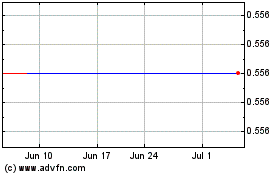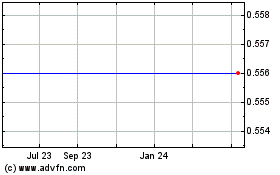- Clinically Meaningful Improvements in Portal
Hypertension in High Risk Compensated Cirrhosis Patients -
Conatus Pharmaceuticals Inc. (Nasdaq:CNAT) today announced top-line
results from the company’s Phase 2b ENCORE-PH clinical trial
showing clinically meaningful treatment effects in compensated NASH
cirrhosis patients at high risk of decompensation. The trial’s
primary endpoint was change in mean hepatic venous pressure
gradient (HVPG) from baseline to Week 24 in any of three emricasan
dosing groups compared with placebo. In the overall trial
population, changes in HVPG from baseline to Week 24 showed trends
consistently favoring emricasan compared with placebo but did not
meet the primary endpoint.
The total patient population was composed of two prespecified
subgroups – patients with compensated NASH cirrhosis (201 of 263
patients, or 76%) and patients with early decompensated NASH
cirrhosis (62 of 263 patients, or 24%). Steven J. Mento, Ph.D.,
President, Chief Executive Officer and co-founder of Conatus, said,
“Based on previous discussions with regulators, we expect that
separate registration trials would be needed in compensated and
decompensated NASH cirrhosis. This trial purposely enrolled mostly
compensated patients, and we are encouraged by the treatment effect
shown in this population in these top-line results.”
In patients with compensated NASH cirrhosis, post hoc analyses
demonstrated consistent improvements in mean HVPG at week 24 over
baseline. In these same patients, clinically meaningful differences
compared with placebo in mean HVPG at Week 24 were observed in a
consistent pattern over multiple baseline HVPG cohorts from ≥13
mmHg through ≥17 mmHg. The magnitude of the improvement in mean
HVPG generally increased as the baseline HVPG levels increased.
Both the 25mg and 50mg active dose groups achieved a >10%
improvement in mean HVPG compared with placebo in all HVPG cohorts
from ≥13 mmHg through ≥17 mmHg, while placebo-treated patients
showed increases in mean HVPG. The greatest improvement was
observed in patients with a baseline HVPG of 16 mmHg or higher.
“Patients with compensated cirrhosis and severe portal
hypertension, that is, with HVPG of 12 mmHg or higher, are at risk
for decompensation, that is, they are at risk for developing
complications such as variceal hemorrhage, hepatic encephalopathy
and ascites that significantly decrease their quality of life and
survival,” said Guadalupe Garcia-Tsao, M.D., Professor of Medicine
in the Section of Digestive Diseases at Yale School of Medicine,
Director of the Clinical and Translational Core at Yale Liver
Center, Chief of the Section of Digestive Diseases at the Veterans
Administration-Connecticut Health Care System, and the central
reader for the HVPG tracings in the ENCORE-PH clinical trial. “We
have recently shown that the risk of decompensation and death rises
with progressive increases in HVPG. Conversely, reductions in HVPG
as small as 1 mmHg can reduce the risk of decompensation or death.
Post-hoc analyses from the ENCORE-PH trial showing that, compared
to placebo, emricasan is associated with clinically meaningful
incremental reductions in HVPG with worsening baseline HVPG levels,
strongly suggest that emricasan has the potential of providing
patient benefit.”
The high-risk subgroup of compensated patients with HVPG ≥16
mmHg at baseline showed a clinically meaningful ≥2-point
improvement in mean HVPG compared with placebo in all three
emricasan dosing groups. A favorable trend compared with placebo in
responses predictive of clinical benefit (≥20% reduction in HVPG
from baseline) was also observed in the total ≥12 mmHg compensated
patient population with the greatest responses observed in the ≥16
mmHg cohort. The baseline HVPG ≥16 mmHg cohort resembles the
patient population studied in the prior Portal Hypertension pilot
study and again shows, now in a placebo-controlled trial, a
clinically meaningful improvement in mean HVPG. In addition, HVPG
of ≥16 mmHg predicts a higher risk of both clinical events and
death1.
“This trial evaluated the ability of emricasan to reduce HVPG in
patients with cirrhosis due to NASH. Although the primary
endpoint was not met, the data indicates an amelioration of portal
pressures by emricasan,” said Arun Sanyal, M.B.B.S, M.D., Professor
of Medicine, Physiology and Molecular Pathology at Virginia
Commonwealth University School of Medicine, chair of the NIH NASH
Clinical Research Network, and chair of the Liver Forum. “Not
surprisingly, those with the highest HVPG had the greatest benefit
and the trends in all groups on sensitivity analyses favored active
therapy. Together, these suggest that the findings are real and
support additional investigation of this compound for those with
compensated cirrhosis due to NASH and high HVPG, i.e., the
population at greatest risk of clinical decompensation for whom
there are no alternate approved therapies.”
Consistent with safety results from 17 previously completed
clinical trials, emricasan was generally well-tolerated in the
ENCORE-PH clinical trial, and the overall safety profile was
similar in the emricasan and placebo groups. Patients enrolled in
the ENCORE-PH clinical trial are continuing treatment or placebo in
a six-month extension period to evaluate longer term safety, liver
function and clinical outcomes, and results on the extension are
expected in mid-2019.
“We believe data from the ENCORE-PH clinical trial as well as
data from our two ongoing ENCORE trials that will be available in
2019 will warrant future discussions with regulatory authorities
regarding potential pivotal trials in patients with NASH and
advanced liver disease,” said David T. Hagerty, M.D., Executive
Vice President of Clinical Development at Conatus. “We are grateful
to the NASH cirrhosis patients who participated unselfishly in the
ENCORE-PH clinical trial, and to the principal investigators who
treated them in compliance with a rigorous protocol. We also thank
the clinical site support staffs and the site monitoring, data
collection and analysis teams who maintained schedule integrity
from launch through results.”
Conference Call/Webcast/PresentationConatus
will host a conference call and webcast at 8:30 a.m. Eastern Time
today, December 5, to discuss the ENCORE-PH top-line results. To
access the conference call, please dial 877-312-5857 (domestic) or
970-315-0455 (international) at least five minutes prior to the
start time and refer to conference ID 9356879. An associated
presentation and live and archived audio webcast of the call will
be available in the Investors section of the company’s website at
www.conatuspharma.com.
About EmricasanEmricasan is a first-in-class,
orally active pan-caspase inhibitor designed to reduce the activity
of enzymes that mediate inflammation and apoptosis. Conatus
believes that by reducing the activity of these enzymes, caspase
inhibitors have the potential to interrupt the progression of a
variety of diseases. To date, emricasan has been studied in
approximately 700 patients in 17 completed clinical trials across a
broad range of liver diseases. In multiple Phase 2 clinical trials,
emricasan has demonstrated clinically meaningful reductions in
severe portal hypertension, improvements in measures of liver
function, and evidence of an anti-fibrotic treatment effect, as
well as rapid and sustained reductions in elevated levels of key
biomarkers of inflammation and cell death, which play a role in the
severity and progression of liver disease.
About ENCORE-PHThe randomized, double-blind
ENCORE-PH Phase 2b clinical trial, initiated in the fourth quarter
of 2016, enrolled 263 NASH patients with compensated or early
decompensated liver cirrhosis and severe portal hypertension
confirmed by HVPG of ≥12 mmHg at baseline. Patients were randomized
1:1:1:1 to receive 5 mg of emricasan, 25 mg of emricasan, 50 mg of
emricasan, or placebo twice daily for 24 weeks. The trial was
conducted at 75 U.S. and EU sites.
About Emricasan Clinical DevelopmentENCORE-PH
is one of three randomized, double-blind, placebo-controlled Phase
2b clinical trials being conducted by Conatus in collaboration with
Novartis, the EmricasaN, a Caspase inhibitOR, for Evaluation
(ENCORE) trials, designed to evaluate emricasan in patients with
fibrosis or cirrhosis caused by NASH. Extension of the ENCORE-PH
trial as well as two additional ENCORE clinical trials are
ongoing:
- ENCORE-PH (for Portal Hypertension) six-month extension, with
48-week liver function and clinical outcome results expected in
mid-2019;
- ENCORE-NF (for NASH Fibrosis), initiated in the first quarter
of 2016, in approximately 330 patients with NASH fibrosis, with
top-line results expected in the first half of 2019; and
- ENCORE-LF (for Liver Function), initiated in the second quarter
of 2017, in approximately 210 patients with decompensated NASH
cirrhosis, with top-line results expected in mid-2019.
About Conatus PharmaceuticalsConatus is a
biotechnology company focused on the development of novel medicines
to treat liver disease. In collaboration with Novartis, Conatus is
developing its lead compound, emricasan, for the treatment of
patients with chronic liver disease. For additional information,
please visit www.conatuspharma.com.
Forward-Looking Statements This press release
contains forward-looking statements within the meaning of Section
21E of the Securities Exchange Act of 1934, as amended. All
statements other than statements of historical facts contained in
this press release are forward-looking statements, including
statements regarding: separate registration trials being
needed in compensated and decompensated NASH cirrhosis; emricasan’s
potential to provide clinical benefit; the timeline to announce
results from the extension phase of the ENCORE-PH trial in
mid-2019; the data from the ENCORE-PH, ENCORE-NF and ENCORE-LF
trials warranting future discussions with regulatory authorities
regarding pivotal trials; the timelines to announce results from
the ongoing ENCORE clinical trials; and caspase inhibitors’
potential to interrupt the progression of a variety of
diseases. In some cases, you can identify forward-looking
statements by terms such as “may,” “will,” “should,” “expect,”
“plan,” “anticipate,” “could,” “intend,” “target,” “project,”
“contemplates,” “believes,” “estimates,” “predicts,” “potential” or
“continue” or the negative of these terms or other similar
expressions. These forward-looking statements speak only as of
the date of this press release and are subject to a number of
risks, uncertainties and assumptions, including: reported
top-line results are based on preliminary analysis of key data and
as a result, such top-line results may change following a more
comprehensive review and may not accurately reflect the complete
results of the clinical trial; Conatus’ ability to successfully
enroll patients in and complete its ongoing clinical trials;
Novartis continuing development and commercialization of emricasan;
Conatus’ reliance on third parties to conduct its clinical trials,
including the enrollment of patients, and manufacture its clinical
drug supplies of emricasan; potential adverse side effects or other
safety risks associated with emricasan that could delay or preclude
its approval; results of future clinical trials of emricasan; and
those risks described in Conatus’ prior press releases and in the
periodic reports it files with the Securities and Exchange
Commission. The events and circumstances reflected in Conatus’
forward-looking statements may not be achieved or occur and actual
results could differ materially from those projected in the
forward-looking statements. Except as required by applicable law,
Conatus does not plan to publicly update or revise any
forward-looking statements contained herein, whether as a result of
any new information, future events, changed circumstances or
otherwise.
1 Berzigotti A et al. Prognostic value of a single HVPG
measurement and Doppler-ultrasound evaluation in patients with
cirrhosis and portal hypertension. J Gastroenterol 2011. DOI:
10.1007/s00535-010-0360-z. Turco L et al. Cardiopulmonary
hemodynamics and C-reactive protein as prognostic indicators in
compensated and decompensated cirrhosis. J Hepatol 2018. DOI:
10.1016/j.jhep.2017.12.027.
CONTACT: Alan EngbringConatus
Pharmaceuticals Inc.(858) 376-2637aengbring@conatuspharma.com
Conatus Pharmaceuticals (NASDAQ:CNAT)
Historical Stock Chart
From Mar 2024 to Apr 2024

Conatus Pharmaceuticals (NASDAQ:CNAT)
Historical Stock Chart
From Apr 2023 to Apr 2024
